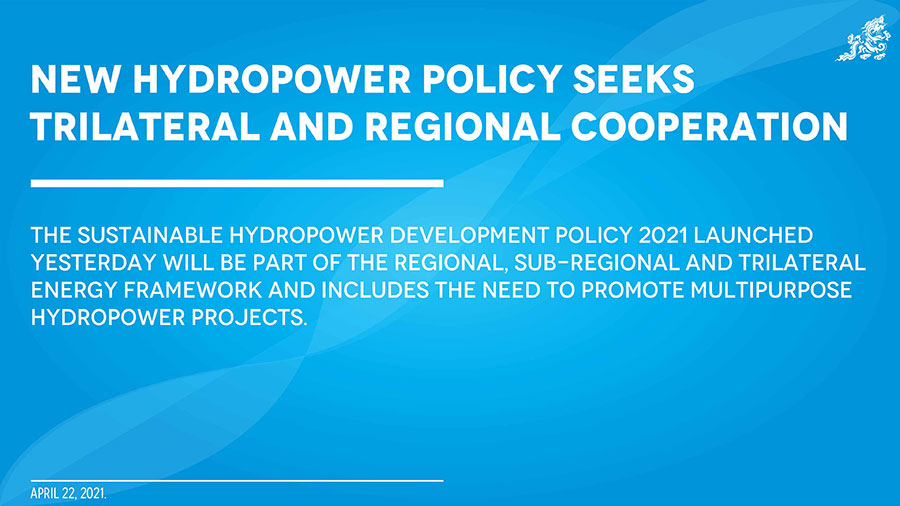… emphasises reservoir and pumped storage hydropower projects
MB Subba
The government will explore trilateral regional, sub-regional, regional cooperation in developing hydropower projects in the country, according to the Sustainable Hydropower Development Policy 2021 launched yesterday.
The policy, which supersedes the hydropower policy of 2008, has come with major changes, including the need to promote multipurpose hydropower projects.
The project will be part of the regional, sub-regional and trilateral energy framework. The policy is aimed at providing greater market access for electricity from Bhutan.
The policy, however, does not abandon the inter-governmental (IG) model wherein the development partner will be responsible for the financing of the project. The government can also develop hydropower projects on its own.
All the hydropower projects will be developed will full ownership of the government. The government, however, will encourage the private sector to venture into hydropower-related ancillary businesses and services.
The policy seeks to diversify the sources of energy and achieve energy security.
Selection of hydropower projects
The policy states that the government should accord priority to develop reservoir and pumped storage hydropower projects to enhance domestic energy security. The provision is aimed at addressing power shortages during the lean season.
A pumped storage hydropower plant provides peak-load supply, harnessing water which is cycled between a lower and upper reservoir by pumps that use surplus energy from the system at times of low demand. When electricity demand is high, water is released back to the lower reservoir through turbines to produce electricity.
Economic affairs minister Loknath Sharma said that the country had to import electricity during the lean season as the existing projects were based on run-off-the river technology. He said that the government would develop alternative sources of clean energy as climate change had affected water sources.
The policy states that the government will encourage, where techno-economically feasible, the development of a multipurpose hydropower project that can be used for recreational and flood control purposes and providing water for drinking and irrigation purposes.
Unlike the previous policy, which had aimed for the generation of 10,000MW by 2020, the new policy does not set an energy generation target. However, it states that the installed capacity addition should be planned and determined based on long-term national objectives.
The policy states that the government should encourage the development of the hydropower value chain. This involves the use of more electricity by local industries to produce finished goods for export rather than export raw hydropower.
The government should create enabling eco-systems for innovations, investment and development of “hydrogen economy” for both domestic and foreign markets. This means that green hydrogen would be promoted as an alternate fuel source for the transport and related sectors.
The policy mandates the employer to give preference to Bhutanese for employment in hydropower projects to the extent possible, based on their skills and capability.
Whenever such expatriates of specialised skills are employed during the construction phase, it will be mandatory for the project developer to ensure that skills are transferred to local workers.
According to the policy, all plants, construction materials, equipment, machinery and services imported for direct use in the construction of projects including associated transmission systems (ATS) may be exempted from any levies, taxes and duties. It mandates the finance ministry to issue a separate tax guideline for hydropower projects.
Hydropower projects that have been implemented prior to the adoption of the new policy will be governed by relevant policies, contracts and agreements.
The minister said that hydropower is a strategic natural resource and from the lesson learnt with its development, there was a need to consider changes in national circumstances, priorities and evolving aspirations of people.
The domestic demand for electricity, he said, is likely to continue to grow at a rate that may soon exceed the generation capacity. The policy aims to enable hydropower development to keep pace with the increase in domestic demand.
Lyonpo said that one of the challenges facing the sector is the climate change impact, which is already visible by way of melting glaciers.
“There is a need to step up collective efforts towards smart and integrated management of watersheds and catchment area protection to make hydropower development a climate-resilient undertaking in times to come,” he said.
The country has achieved an installed capacity of 2,326MW over a span of four decades.


